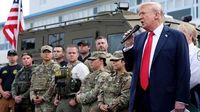On September 4, 2025, Washington, D.C. was thrust into the heart of a constitutional standoff as the city’s Attorney General, Brian Schwalb, filed a federal lawsuit against the Trump administration. The suit, announced with a flourish on social media and quickly picked up by national outlets, challenges the ongoing deployment of more than 2,000 National Guard troops in the nation’s capital—a move Schwalb describes as an "involuntary military occupation" that tramples on D.C.’s right to self-rule, threatens civil liberties, and upends the city’s fragile relationship with its residents.
The roots of the controversy stretch back to August 11, when President Donald Trump invoked the District of Columbia Home Rule Act to federalize D.C.’s Metropolitan Police Department for a 30-day period. According to Fox News Digital, this emergency measure was designed to combat what the administration called a surge in violent crime. But as armored vehicles rolled through city streets and roughly 2,300 National Guardsmen—many from states as far-flung as Louisiana, South Dakota, Ohio, West Virginia, Tennessee, Mississippi, and South Carolina—took up positions in military gear, local leaders and civil rights advocates sounded the alarm.
“Armed soldiers should not be policing American citizens on American soil,” Schwalb wrote in his announcement on X (formerly Twitter), echoing the central argument of his lawsuit. He insisted that "DC did not request or consent to the deployment of National Guard troops. Yet there are 2,300 National Guardsmen on our streets in military gear, carrying weapons, and driving armored vehicles." The attorney general’s complaint, filed in federal court, goes further, arguing that the deployment violates both the Posse Comitatus Act—a 19th-century law prohibiting the military from engaging in domestic policing—and the 1973 Home Rule Act, which grants the district a measure of self-governance.
The legal filing is sweeping in its condemnation. “No American jurisdiction should be involuntarily subjected to military occupation,” the complaint states, as reported by The Washington Post. It adds that the Trump administration’s "command and control of out-of-state National Guard units when they are in state militia status violates the Constitution and federal law." The document paints a picture of a city under siege, describing the deployment as a "massive, seemingly indefinite law enforcement operation in the District subject to direct military command." The dangers, Schwalb contends, are clear: "The danger that such an operation poses to individual liberty and democratic rule is self-evident."
Schwalb’s concerns are not limited to abstract principles. He argues that the presence of troops—many of whom lack formal law enforcement training—has sown confusion, fear, and distrust among residents. In his words, “They create confusion, sow fear, erode trust, inflame tensions, and harm the crucial relationship between police and communities they serve.” The attorney general also contends that the deployment has had a chilling effect on the city’s economy, depressing vital sectors such as restaurants, hotels, and tourism.
Supporters of the Trump administration’s strategy, however, see things very differently. White House spokeswoman Abigail Jackson pushed back forcefully against Schwalb’s claims, telling Fox News Digital, “President Trump is well within his lawful authority to deploy the National Guard in Washington, D.C. to protect federal assets and assist law enforcement with specific tasks.” She dismissed the lawsuit as "nothing more than another attempt—at the detriment of DC residents and visitors—to undermine the President’s highly successful operations to stop violent crime in DC."
The legal and political stakes are high, especially as the 30-day emergency control period is set to expire around September 10. Yet, the uncertainty lingers. On August 20, Vice President JD Vance suggested the mission might be extended with Congressional approval, and the administration has shown little sign of backing down. In fact, on August 25, President Trump signed an executive order expanding the National Guard’s role even further, creating a specialized unit within the D.C. National Guard dedicated to "ensuring public safety and order in the nation’s capital." Schwalb warns that such moves could make the deployment open-ended, noting, “There is no clear end date to this illegal deployment,” and that more troops arrived in the capital just this week.
This legal battle is unfolding against a broader national backdrop. Just days before Schwalb’s lawsuit, a federal judge in California issued a ruling declaring the Trump administration’s deployment of federal troops to Los Angeles during immigration protests illegal. That decision, which drew praise from California Governor Gavin Newsom and Los Angeles Mayor Karen Bass, has emboldened critics of the administration’s approach to law enforcement and public order. The D.C. lawsuit also follows another legal challenge Schwalb filed on August 15, seeking to block the federal takeover of the Metropolitan Police Department and arguing that it, too, violated the Home Rule Act.
At the heart of the dispute is a fundamental question: Who gets to decide how America’s capital is policed? The Trump administration maintains that it is acting within its rights to protect federal property and ensure public safety, especially given D.C.’s unique status as a federal district rather than a state. Yet, Schwalb and his supporters argue that the administration’s actions are an overreach, trampling on the district’s limited autonomy and setting a dangerous precedent for the use of military force in American cities.
The lawsuit also spotlights the ongoing tension between federal and local authority in Washington, D.C.—a city whose residents have long chafed at their lack of full self-governance. The Home Rule Act of 1973 gave D.C. a locally elected government, but Congress and the president still wield significant power over the district’s affairs. The current standoff, Schwalb says, is a stark reminder of the limits of that autonomy. “Our nation was founded on the fundamental principles of freedom and self-governance that are at stake in this case. No city in America should be subject to involuntary military occupation.”
As the legal process unfolds, both sides are preparing for a protracted fight. The Trump administration is reportedly exploring the use of National Guard units for crime prevention in other cities, despite the recent California ruling. Meanwhile, Schwalb’s lawsuit seeks not just to remove the troops from D.C., but to reaffirm the principle that military force should not be used for routine law enforcement in American communities.
For residents of Washington, D.C., the outcome will have immediate and tangible consequences. But for the rest of the country, the battle may set a precedent with far-reaching implications for the balance of power between federal authority and local self-rule. As the capital waits for the courts to weigh in, the city remains under the watchful eyes of both the National Guard and a nation grappling with the boundaries of democracy and security.





